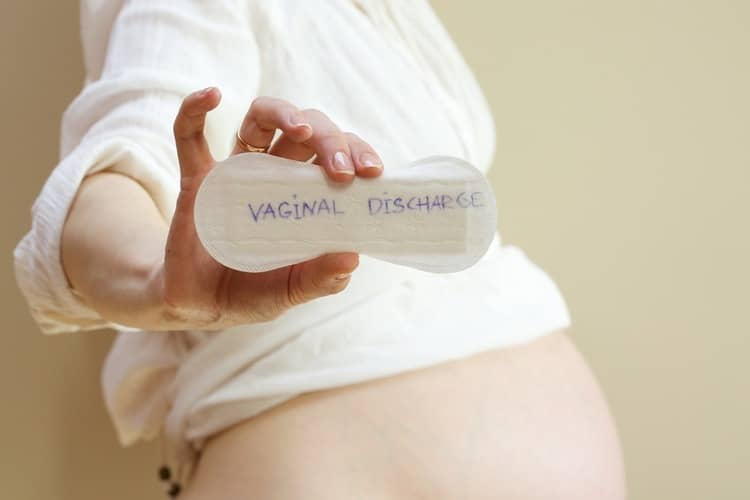
Discharge during pregnancy - what does brown, yellow and white mean?
Various symptoms are an integral part of pregnancy, which can often complicate a woman's daily life. Many of them are completely normal manifestations of changes in a woman's body due to pregnancy, but there are also symptoms that need to be monitored more carefully in order to avoid incorrect justification of their occurrence and effects on the body. Vaginal discharge during pregnancy is also such a symptom, the cause of which can be found based on its color, consistency, frequency or intensity.
We have summarized the answers to the questions whether thick discharge during pregnancy is normal and where the cause of different colored discharge from the vagina during pregnancy comes from in the following paragraphs of our article.
Is vaginal discharge common during pregnancy?
In its essence, it is a common pregnancy symptom, in which there is an increase in the production of vaginal discharge. Like most pregnancy symptoms, this one is also attributed to excessive hormonal changes that occur in the female body from the initial stage of pregnancy, and thus fertilization.
This symptom should also be carefully monitored. Any suspicious change in consistency, color or other symptoms such as swelling, itching or pain may indicate the presence of an infection in the genital tract of a pregnant woman.
The truth is that, due to pregnancy, a woman becomes susceptible to various types of infectious diseases that can seriously endanger the fetus itself. Therefore, if you notice that there has been a certain change compared to the discharge normally secreted during pregnancy, we recommend visiting a gynecologist who will perform a vaginal smear.
This will tell the doctor where the potential cause of the infection originates, on the basis of which the gynecologist can set the right form of treatment to protect you and your baby. The infection can cause an unexpected outflow of amniotic fluid and the initiation of premature birth.

Discharge in the first trimester
In the early weeks of pregnancy, a pregnant woman may discharge vaginal secretions with a little blood. Such brown discharge during pregnancy causes irritation of the genitals of the woman, in whose body the egg is gradually implanted.
Over time, however, all the bloody admixture evaporates from the discharge and the baton is taken over by the white watery discharge in pregnancy. The yellow coloring of the secretion secreted from the vagina is also natural. The consistency of a watery character and the delicate coloring are caused by the excessive production of estrogen in the body of a pregnant woman.
Discharge in pregnancy during the second trimester
Vaginal discharge continues to be an integral part of pregnancy, even in the second stage of pregnancy, while the cause is the constant production of estrogen. Yellow discharge can often occur during pregnancy, which is mainly caused by a yeast or bacterial infection. Therefore, regular check-ups with a gynecologist are very important, as he can detect the occurrence of such infections in the vaginal mucosa in the early stages.
The discharge in the 40th week is stronger
In general, in the third trimester, i.e. from the 28th week of pregnancy, significantly thicker yellow-brown discharge can occur, which means that the mucous plug will soon be expelled. In the later weeks of the third trimester, the intensity of vaginal discharge increases, which may mean that the amniotic fluid is gradually draining away. This period is particularly unpleasant for pregnant women, as it often results in wet underwear.

What does the color of the discharge indicate during pregnancy?
Vaginal discharge is a completely normal part of a woman's life, while during pregnancy its secretion intensifies due to the increased level of hormones. Such discharge is characterized by its clarity, which is not accompanied by any odor.
However, if you notice a smell, a strange consistency or a different color of the vaginal discharge during pregnancy, it is quite likely that it is a certain type of infection that needs to be treated immediately in order to avoid endangering the fetus and therefore your pregnancy.
White or yellow watery discharge during pregnancy
White discharge in pregnancy with a watery consistency resembling mucus is a natural part of the pregnancy period. As we mentioned above, its excretion occurs due to the increased level of the hormone estrogen, and if it is not accompanied by an odor or itching, there is no need to worry about anything. This is a completely normal symptom of pregnancy.
With the onset of the later stages of pregnancy, a change in the color of the vaginal discharge naturally occurs. It often acquires a yellowish hue. However, the consistency of the yellow discharge during pregnancy should still remain watery, and the smell should not accompany this secretion either.
If your discharge during pregnancy meets all these "conditions", there is no need to worry unnecessarily about its cause. It is a sign of pregnancy caused by hormonal fluctuations and increased mucus production, both of which indicate that the due date is approaching.

Yellow-green discharge during pregnancy is not a good sign
The color of the vaginal discharge can sometimes change its shade to dark yellow to yellow-green, which may indicate that an infection has entered the pregnant woman's body. If you are not convinced by the different color of the discharge during pregnancy, the peculiar smell reminiscent of fish and the thick consistency should definitely cause you some concern.
In such a case, we recommend a visit to a gynecologist, who can provide you with a diagnosis and the necessary form of treatment, which should eliminate the risk for your pregnancy, and therefore for the gradually developing fetus.
The meaning of brown discharge in pregnancy depends on the period of its occurrence
Brown discharge from the vagina resembling the first or last days of the menstrual cycle is a common sign of pregnancy in the first days after fertilization. Then the egg implants in the uterus, which can cause slight bleeding, which turns the vaginal discharge brown.
In the same way, the secretion of such a secretion can also occur in the final stage of pregnancy, when there is an excessive production of mucus. If you notice such brown vaginal discharge outside of the mentioned stages of pregnancy, it may be premature birth, separation of the placenta or a violation of the vaginal mucosa. Then it is better to visit your gynecologist, who will check whether your pregnancy is going without problems.
Pink discharge in pregnancy
Vaginal discharge acquires a pink color due to the mixing of fresh blood. Despite the fact that its occurrence in the early stages of pregnancy, i.e. up to two weeks after fertilization, is completely natural due to the ongoing process of implantation of the egg, it can also be the initial manifestation of an ectopic pregnancy, which requires immediate medical intervention.
A yeast infection can manifest itself in this way, which causes irritation and disruption of the vaginal mucosa. However, under no circumstances should pink discharge appear in advanced pregnancy.
If you notice such a phenomenon, you must visit your gynecologist. If you have a strong vaginal discharge with a pink color, do not hesitate to go to the nearest hospital immediately. It can be a serious threat to the pregnancy, and thus to the fetus itself.

Beware of green discharge during pregnancy
Green coloring may indicate something positive in everyday life, but in the case of vaginal discharge during pregnancy, this color speaks of the exact opposite. A brownish to green discharge most likely indicates the presence of a serious infection or sexually transmitted disease in the body of a pregnant woman.
Often, this color of vaginal discharge can be accompanied by a sour smell and a lumpy consistency. In addition to smelly discharge during pregnancy, other accompanying symptoms of venereal diseases and serious infections of the genital tract during pregnancy include pain and burning during urination, bleeding, swelling or pain in the lower abdomen.
This situation must be dealt with as soon as you register such changes in discharge and associated manifestations, because due to the influence of venereal diseases and various infections of the genital system, pregnancy and the fetus are gradually threatened.
When is it necessary to see a doctor?
If you notice any suspicious change in the consistency or color of the discharge, or if you feel burning when urinating, itching, swelling or pain in the lower abdomen, definitely visit your gynecologist, who will examine you, and if any type of infection is confirmed, he will determine the exact form of treatment that is gentle on your the body and the developing fetus.
From the point of view of consistency, it is necessary to consult a doctor when you notice an excessively thick or lumpy discharge or an unnaturally thin secretion. Of course, any deviation from normal is suspicious. You should also pay attention if you smell even a whiff of a sour, fishy or other unpleasant smell, the source of which is vaginal discharge during pregnancy.

Prevention of infections affecting the genital organs of a pregnant woman
The most important thing is first of all to observe basic hygiene, which generally prevents the creation of an ideal environment for the occurrence of bacterial infections or infections of another kind. During pregnancy, it is recommended to avoid public swimming pools and hot tubs, but you should also limit your stay in a hot bath.
If you still want to cool down in the summer months, we recommend that you change into a wet swimsuit as soon as possible after swimming in order to prevent infection. Thorough drying of the genitals is also necessary after a regular shower or exercise.
From the point of view of underwear, you should prefer cotton during pregnancy, while a decisive "NO" belongs to underwear of synthetic origin, but also to pants with a narrow and tight cut. It is also important to use the correct hygiene products intended for cleaning the genital area. You should prefer unscented hygiene products of an intimate nature.
You should limit sweets in your diet, because they cause the creation of an ideal environment for the development of candidiasis, or yeast, through sugar secreted into the vagina. White yogurts with probiotics should definitely become part of your daily eating habits.
In the event of any discharge, including normal odorless and discolored discharge, it is recommended to use sanitary napkins to catch it. Tampons naturally prevent the outflow of vaginal secretions, which can spread more serious infections or inflammations in your genital system.
Discharge in pregnancy - experience
Women's experiences with discharge during pregnancy naturally vary. While some had problems with constant discharge throughout the pregnancy without other accompanying phenomena, which forced them to wear intimate pads until delivery, other women experienced torment in the form of itching and burning, which resulted in a yeast infection.
All discussants recommended visiting a doctor, who should perform a basic examination, or take a sample and send it for culture. Based on the results, the relevant doctors then prescribed vaginal capsules or other forms of treatment, but they did not always work. Infections of the genital tract are a very sensitive matter, especially during pregnancy, which requires time and patience.
The most frequent questions - FAQ
In the event that you did not find the information you were looking for in the article on the most important aspects of discharge in pregnancy, but also in the question and answer section, do not hesitate to contact us in the comments section. We try to answer in the shortest possible time.
What kind of vaginal discharge is normal just before giving birth?
Can I try some home remedies first if I notice a change in discharge during pregnancy?
What can happen if I don't deal with the infection in time?
After identifying the infection, can I start the treatment by rinsing the vagina?
Is smelly discharge during pregnancy normal?
Pridať komentár







